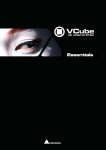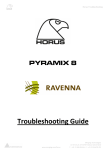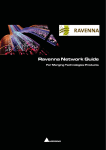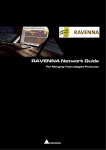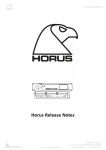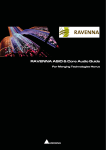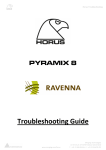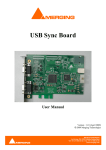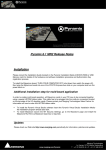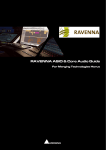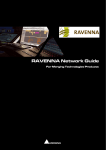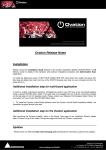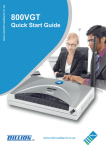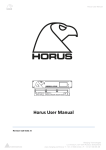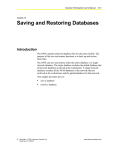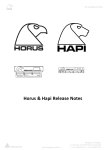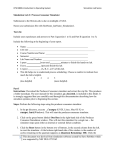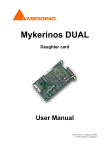Download ASIO (PC) Core Audio (MAC) Guide
Transcript
____________________________________________________ ASIO (PC) Core Audio (MAC) Guide www.merging.com Merging Technologies Le Verney 4, CH-1070 Puidoux Switzerland T : +41 21 946 04 44 • F : +41 21 946 04 45 ASIO & Core Audio Guide No part of this documentation may be reproduced in any form whatsoever or be stored in any data retrieval system without prior written permission of the copyright owners. This documentation is supplied on an as-is basis. Information contained within this documentation is subject to change at any time without notice and must not be relied upon. All company and product names are ™ or Registered Trademarks ® of their respective owners. Windows 7 is a trademark of Microsoft Corporation. Lion and Core Audio are trademarks of Apple Corporation. Merging Technologies makes no warranties express or implied regarding this software, its quality, performance, merchantability or fitness for a particular purpose. The software is supplied “as is” you, the purchaser, are assuming the entire risk of the results of using this Merging Technologies software. In no circumstances will Merging Technologies, its owners, directors, officers, employees or agents be liable to you for any consequential, incidental or indirect loss or damages including loss of time, loss of business, loss of profits, loss of data or similar resulting from the use of or inability to use the Merging Technologies hardware and or software or for any defect in the hardware software or documentation. Product features and specifications are subject to change without notice. © Copyright Merging Technologies Inc. 2012. All rights reserved Merging Technologies, Pyramix and Horus are registered Trademarks of Merging technologies SA. Product features and specifications are subject to change without notice. Merging Technologies SA shall not be liable for technical or editorial errors contained herein, nor for incidental or consequential damages resulting from the furnishing, performance or use of this manual. Merging Technologies, Le Verney 4, CH-1070 Puidoux, Switzerland. Fax. +41 946 0445, Web: www.merging.com www.merging.com 15 Page 2 - ASIO & Core Audio Guide Thank you! Congratulations on your Merging Technologies purchase. More than just a product, this is a gateway to the future of sound processing, transmission and distribution. You have joined a worldwide community of users who have already discovered the Merging advantage. Note: IMPORTANT! - The first thing you need to do is register your software to acquire your security key(s) and to be included in our user support list. Please also subscribe to the User Forum at: http://www.merging.com/forum/ Introduction RAVENNA is a solution for real-time distribution of audio and other media content in IP-based network environments. It was designed primarily by a company called ALC NetworX. RAVENNA utilizes standardized network protocols and technologies and can operate in existing network infrastructures. Performance and capacity scale with the capabilities of the underlying network architecture. For further details please see: http://ravenna.alcnetworx.com/ Scope This document is intended to get you up and running Ravenna in ASIO/CoreAudio with your Merging Technologies Horus converter on your PC Windows system or MAC OSx system. For more detailed information about the Horus and the Pyramix and Ovation software please see their specific Guides. If you have purchased MassCore-Ravenna as part of an integrated (Turnkey) system, the installation information in this guide will be redundant, since these systems come with all hardware and software pre-installed. If you are configuring your own system, please refer to the following instructions. Content Merging Ravenna ASIO Driver For PC users running on Windows 7 Page 4 Merging Ravenna Core Audio Driver: For MAC users running Lion OSX Page 9 Troubleshooting: Page 15 www.merging.com 15 Page 3 - ASIO & Core Audio Guide Ravenna ASIO (PC) Guide www.merging.com 15 Page 4 - ASIO & Core Audio Guide Merging Ravenna ASIO Driver (PC) The Ravenna ASIO Driver is intended for owners of the Horus hardware that are on Windows 7 and that wish to work in ASIO Ravenna mode. ASIO: Steinberg’s Audio Stream Input/Output (ASIO) provides audio stream connectivity between software applications and audio hardware on Windows. System Requirements Wintel platforms tend to increase in number of cores, speed and performance at a tremendous rate. New and faster processors are released almost on a monthly basis. We maintain a list of up to date PC configurations in the Support Section of our website at: http://www.merging.com/pages/pcconfig Refer to the Merging Ravenna recommendations (QuadCore minimum requirement) Certified PC Operating Systems (OS) We recommend installing the ASIO driver under Windows 7 Professional 32 bit or 64 bit. Note: Although not certified, it has also been observed to work under the Home editions of Windows 7 (32-bit). The ASIO driver is not supported under XP nor Vista. Warning: NEVER attempt to install the Driver on Windows NT Server The ASIO Driver was tested and qualified on Windows 7 Professional 32 bit and 64 bit Notes: Available as of the release of Pyramix v8 The Ravenna ASIO driver supports up to 4FS (192kHz) Windows 7 - 32bit & 64bit (make sure that you download the proper installer) Numbers of inputs and outputs available 1FS (44.1kHz / 48kHz) = 64 I/O 2FS (88.2 kHz / 96kHz) = 32 I/O 4FS (176.4 kHz / 192 kHz) = 16 I/O The ASIO Driver cannot be used with multiple applications at the same time. Only one application at a time can use the ASIO Driver on the same system. It is recommended that you use a separate sound card for your other general work. Tips: Make sure that you activate (set to Auto) the ASIO/CoreAudio clock under the Horus menu setup>advanced Sampling rate changes must be done from the Horus. The ASIO host will follow the Horus sampling rate changes Disable your Antivirus and your Windows Public Firewall The MassCore PCIe card NET-MSC-GBEX1 cannot be used with the Ravenna ASIO driver www.merging.com 15 Page 5 - ASIO & Core Audio Guide Installing the Ravenna ASIO Driver The Merging Ravenna ASIO Driver can be installed on PC systems that do not have Pyramix installed, but at least one Horus is required for the Driver to work if other Ravenna devices are present. Find here the description of the Merging Ravenna ASIO Driver installation steps for Horus/Ravenna users. 1. Download the latest Merging Ravenna ASIO Driver from http://www.merging.com/horus/download 2. Be aware that a 32bit and 64 bit versions are available and certified under Windows 7 only. Verify your current OS configuration and then download and install the appropriate Ravenna ASIO driver version. 3. Disable the Windows UAC (User Account Control) set it to never notify and restart your system. We also recommend that you disable the Windows Firewall when working in Ravenna. 4. The installer might warn you of pending requirements (Bonjour & Microsoft Redistributable C++ 2008 SP1) accept and proceed with those installations. 5. Afterwards Accept the software install agreement 6. Open the Ravenna ASIO Panel (under windows Start Menu>Merging Technologies) www.merging.com 15 Page 6 - ASIO & Core Audio Guide 7. Configure your Merging Ravenna ASIO Settings A. The Local Adapter (will list all network ports): Chose the network port where the Horus is connected (Laptop example below: Broadcom Netlink Gigabit Ethernet) B. The buffer sizes available are: 512 - 256 - 128 – 64 [smpl] Based @ 1FS (44.1kHz/48kHz) A buffer size of 256 samples is recommended C. Number of I/O channel available: 64 maximum D. Monitoring: Opens up a panel used for debugging 8. Restart your system after the driver installation 9. Configure your application (Pyramix or other DAW) in order to use the Merging Ravenna ASIO Driver 10. If using Pyramix the users must open the VS3 Control Panel and make sure that the Driver Merging Ravenna ASIO driver is selected under the I/O Selection 11. Make sure that the Horus is connected to the Gigabit Ethernet port and launch Pyramix Bundled applications and documentations Additional applications and documentation will be installed along the Merging Ravenna ASIO drivers. Look under your windows start up menu in order to find the entries below. Documentations: Find documentation on all applications and utilities MTDiscovery: MT Discovery is a standalone application that searches your network for Bonjour Services. It allows quick and easy access to Merging’s Web Services based on Bonjour, such as the Horus configuration page. These pages will be open in your computer’s default browser. Users can also use MT Discovery for the Horus remote access and in order to update their Horus Firmware. Refer to the MTDiscovery User Manual for more details. Ravenna Easy Connect: The Ravenna Easy Connect utility is included in the ASIO and Core Audio Drivers package. This utility will enable the Horus users to connect the Ravenna visible streams and route accordingly the desired I/Os. Refer to the Ravenna Easy Connect documentation guide for more details. www.merging.com 15 Page 7 - ASIO & Core Audio Guide Merging Ravenna ASIO Driver panel: This will open the Ravenna ASIO Driver Settings for configuration Note: The custom installation of the Ravenna ASIO drivers allows user not to install the MTDiscovery and Ravenna Easy Connect applications. Ravenna ASIO Driver Known Issues: Ravenna ASIO Panel It is recommended to close the application (DAW) if needing to change some settings in the Ravenna ASIO panel. Restart application after the changes. Note that the sampling Rate changes must be done on the Horus, as the DAW will follow the Horus sampling rate. Buffer size recommendations Merging recommends to set the buffer size to 256 samples Latency and clicks Note that audible pops and clicks can occur when using some third-party audio interfaces or depending on the speed of the processor. Try increasing the Hardware Buffer size for the device to avoid this problem as you should aim for the lowest possible I/O buffer size value that doesn’t introduce clicks, pops, and crackles in your audio. No Playback no I/Os - Potential problem when changing sampling rate (DAW cursor locked or mismatch sampling rate), In such case make sure that when you exit your DAW (Pyramix) and change the sampling rate on the Ravenna ASIO panel first and then launch back your DAW (Pyramix) and make sure that the project sampling rate and the Horus sampling rate is also matching the Ravenna ASIO panel sampling rate. Re-start if needed - On the Horus make sure that the ASIO/CoreAudio Clock in enabled (auto) under the Horus page SetUp>Advanced - If problem persists then force a Clear all Connections under Easy Connect (CTRL+ Click on Clear All Connections), restart and redo your connections. Firewall and Antivirus: Windows Firewall: The Windows Firewall can block communication between MassCore and Horus. We recommend users to disable the Public Network Firewall Procedure: 1. Go in Windows Control Panel > Windows Firewall. 2. Click on “Turn Windows Firewall on or off” 3. Go to the Public Network section and select “Turn Off Windows Firewall” Disable Antivirus: Merging also recommends users to disable their Antivirus, some Antivirus as Avast have been known to block the Horus discovery and Ravenna I/O Connections Ravenna ASIO Driver error when launching VS3 control Panel If you have an error such as “unable to bind to the network interface” make sure that you disable the Windows UAC (User Account Control), set it to “Never Notify” and restart your system. www.merging.com 15 Page 8 - ASIO & Core Audio Guide Ravenna CORE AUDIO Guide * will be available shortly * www.merging.com 15 Page 9 - ASIO & Core Audio Guide Merging Ravenna Core Audio Driver (MAC) * will be available shortly * The Core Audio Driver is available for owners of the Horus hardware that are on Mac OS X Lion and that wish to work with the Core Audio Driver in Ravenna mode. Core Audio: Apple’s Core Audio is a standardized audio driver system for all Macintosh computers running Mac OS X version 10.2 or later. Core Audio is an integral part of Mac OS X, allowing access to all audio interfaces that are Core Audio compatible. System Requirements We recommend installing the Core Audio driver under Lion OS X Certified MAC Operating Systems (OS) The CoreAudio Driver was tested and qualified on Mac OS X Lion v10.7 Notes: To support up to 4 FS Numbers of inputs and outputs available 1FS (44.1kHz / 48kHz) = 64 I/O 2FS (88.2 kHz / 96kHz) = 32 I/O 4FS (176.4 kHz / 192 kHz) = 16 I/O Tips: Make sure that you activate (set to Auto) the ASIO/CoreAudio clock under the Horus menu setup>advanced User must close their application (DAW) if needing to change some settings in the Ravenna Core Audio panel. Restart application after the changes. Installing the Ravenna Core Audio Driver Find here the description of the Ravenna Core Audio Driver installation. The Merging Ravenna Core Audio Driver can be installed as a stand-alone driver on systems that do not necessarily have Pyramix installed, but at least one Horus is required for the Driver to work if other Ravenna devices are present. 1. Download the Ravenna Core Audio Installer for MAC http://www.merging.com/horus/download 2. Open the Merging Ravenna Core Audio Installer .dmg file www.merging.com 15 Page 10 - ASIO & Core Audio Guide 3. Press “Continue” to proceed with the installation 4. Perform the “Install” afterwards. You will be prompt to enter the Administrator password 5. The Install should complete and say “Successful”. Once done press “Close” 6. Restart your MAC after the driver installation 7. Go under you MAC System Preferences, in "Other” you will “Merging Ravenna” icon which you should open 8. Configure your Ravenna Core Audio panel A. Make Sure that The Ravenna Server is running B. The Ravenna Network Interface, will list all network ports. Chose the network port where the Horus or Ravenna Device is connected to (example below: Ethernet 1) C. The number of Input and Output channels available is limited to 64 I/O D. The buffer sizes available are: 1024 - 512 - 256 - 128 – 64 [smpl] Based @ 1FS (44.1kHz/48kHz) www.merging.com 15 Page 11 - ASIO & Core Audio Guide www.merging.com 15 Page 12 - ASIO & Core Audio Guide Bundled applications and documentations Additional applications and documentations will be installed along with the Ravenna Core Audio installer. Look under Places to find all the necessary tools and information in order to work in Ravenna mode. MTDiscovery: MT Discovery is a standalone application that searches your network for Bonjour Services. It allows quick and easy access to Merging’s Web Services based on Bonjour, such as the Horus configuration page. These pages will be open in your computer’s default browser. Users can also use MT Discovery for the Horus remote access and in order to update their Horus Firmware. Refer to the MTDiscovery User Manual for more details. Ravenna Easy Connect: The Ravenna Easy Connect utility is installed along Pyramix v8 and included in the ASIO and Core Audio Drivers package. This utility will enable the Horus users to connect the Ravenna visible streams and route accordingly the desired I/Os. Refer to the Ravenna Easy Connect documentation guide for more details. Uninstaller Use the uninstaller if you want to remove cleanly the Merging Ravenna Core Audio installed Documentations: Find documentation on all applications and utilities www.merging.com 15 Page 13 - ASIO & Core Audio Guide Ravenna Core Audio Known Issues: Ravenna Core Audio panel User must close their application (DAW) if needing to change some settings in the Ravenna Core Audio panel. Restart application after the changes. Ravenna Server For the driver to function properly make sure that the Ravenna Server is running in the Ravenna Core Audio panel. If not running, start it up Buffer size recommendations A buffer size of 256 samples is recommended for the moment Latency and clicks Note that audible pops and clicks can occur when using some third-party audio interfaces or depending on the speed of the processor. Try increasing the Hardware Buffer size for the device to avoid this problem as you should aim for the lowest possible I/O buffer size value that doesn’t introduce clicks, pops, and crackles in your audio. Security Firewall The MAC Firewall can block communication between Ravenna and Horus. Recommendation: Disable by switching it to ‘OFF” Latency and clicks Note that audible pops and clicks can occur when using some third-party audio interfaces or depending on the speed of the processor. Try increasing the Hardware Buffer size for the device to avoid this problem as you should aim for the lowest possible I/O buffer size value that doesn’t introduce clicks, pops, and crackles in your audio. www.merging.com 15 Page 14 - ASIO & Core Audio Guide General Troubleshooting: Ravenna: Horus & Network configuration 1. First check IP address of Horus device under Setup page > Network To be able to see each other, Merging Technologies Network card and Horus must be in the same range of address. (for example 192.168.xxx.xx). 2. The Horus IP address can be set checked (Horus Setup page>Advanced> Network) 3. The IP address of the MT Network card can be changed in Windows Control Panel > Change Adapter Settings 4. Right click on your Ethernet card and select Properties. 5. Select Internet Protocol Version 4 (which is the only one activated) and click on Properties. 6. Switch to Use the following IP address and enter an IP address that is in the same range as the Horus IP address. The Subnet Mask should be added automatically. Note: we’ve seen on some laptop that the Ethernet card driver had to be updated (2012) in order to work with Horus/Ravenna in some range of addresses. Working with multiple Horus over a network: Please refer to the Merging Ravenna Network guide for all details on the configuration and setup. Ravenna Connections: If you cannot connect devices in Ravenna Easy Connect make sure that the Horus Firmware is in synchronization with the latest ASIO or Core Audio driver Latency and Buffers Small buffers have the advantage of low latency in the record monitor path, but also are more taxing on your computer’s CPU and could contribute to dropouts in your audio during record or playback. Larger buffers have the advantage of making the CoreAudio Driver more immune to audio dropouts during playback and recording, but can cause a noticeable delay when monitoring your inputs in the recording process. In some CoreAudio-client applications, performing various tasks will interrupt the CoreAudio Driver and may result in clicks and pops in audio playback or recording. Choosing a different buffer sizwe can help alleviate this problem. www.merging.com 15 Page 15 -















